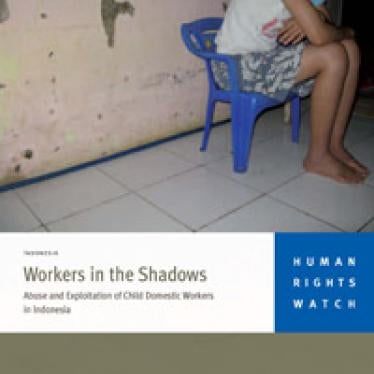What does this weekend's Domestic Workers' Day mean to the approximately 700,000 Indonesian children who toil in these jobs? Absolutely nothing. Yes, there will be meetings and rallies and events, but most child domestic workers across Indonesia will spend this weekend just like every other weekend: working.
That might come as a surprise to many politicians and government officials. As a senior official in the Jakarta Manpower Agency told me recently, these girls were not "real workers" - an opinion expressed repeatedly by too many officials I have interviewed who classify them as simply "helpers." Domestic work, he told me, simply did not meet the definition of work.
But many of these children would disagree. I recently met 13-year-old Ayu in Bandung. Ayu began working full-time when she was only 11 because she wanted to help her parents afford to send her younger siblings to school. At her first job, Ayu's day started at 5 a.m. and she worked until 7 p.m. But the work did not really stop then because she also looked after the employer's 9-month-old baby, so even at night she was always on call. After just three months, Ayu had to quit because the long hours were making her ill. "I got sick -- I got way too tired," she told me. When you are working hard enough to make you sick, that is not "help." Indeed, it is more than mere "work": it is exploitation.
Perhaps domestic workers are better placed than the politicians to judge whether what they do constitutes work. Dian, 17, explained it to me best: "Without my work at the home during the day, people who live in the house would not be able to do so-called ‘formal work' in their offices. And yet government people still say that we are second class citizens!"
The child domestic workers I have spoken with typically work 14- to 18-hour days, seven days a week, with no holidays, although some are allowed one week of leave at Eid-ul-Fitr. When they actually get paid a salary-and not all do-their hourly wage is paltry in comparison with the local prevailing minimum wage that would be required, for example, for a boy working in a local factory. Dian's hourly salary, for example, calculates out to around 600 rupiah an hour.
Once we recognize that child domestic workers carry out activities that are taxing, productive, and deserving of being recognized as work, it flows naturally that they also deserve equal treatment. If boys working in other people's factories deserve such protections, then so do girls working in other people's homes. Indeed, given their age, their dependence on their employers for food and housing, and their isolation in private homes, child domestic workers need additional protections and attention.
That will require legal reform. The Ministry of Manpower and the People's Representative Council should get to work on that right away by ensuring the passage of a Domestic Workers Law that guarantees that domestic workers receive the same rights as other workers, such as a written contract, a minimum wage, overtime, a weekly day of rest, an eight-hour workday, rest periods during the day, national holidays, vacation, and paid sick leave.
But while the politicians have their work to do, girls like Ayu should actually not be working fulltime at all. Under Indonesian law, children younger than 15 are not allowed to work fulltime. What is more, Ayu and her younger siblings should have been able to enjoy a free education until they completed nine years of compulsory schooling. However, costs associated with education often force poor girls and boys to drop out. This contributes to children being pushed into the labor force.
Endah, whom I met in Bekasi, told me that she had to drop out of school after the seventh grade because she could not afford the building fees, the uniform fees, and the cost of books. Fifteen-year-old Budiwati had to drop out after fifth grade, but told me how she is now paying for her younger sister's schooling. "I want my younger sister to finish college and get a proper job so she doesn't have to have an improper job like me," she said.
In Yogyakarta, there is now a program that allows students who have dropped out of school because of the costs to return, free. This program, however, is only for official residents of the city. Children who have migrated from rural areas to the city for work are not considered residents and do not qualify. Expanding Yogyakarta's program to all children living and working in the city and the development of similar programs around the country could benefit tens of thousands of children who otherwise have no option but to work rather than study.
These girls live and work in the shadows of society: hidden behind the locked doors of their employer's homes, isolated from their family and peers, and with little regulatory oversight by the government. It is time for that to change. So, in this election year maybe there are some other people besides the child domestic workers who should be working this weekend: the politicians.
The author, Bede Sheppard, is a researcher in the Children's Rights Division of Human Rights Watch, and the author of the new report Workers in the Shadows: Abuse and Exploitation of Child Domestic Workers in Indonesia. Human Rights Watch is an international human rights organization that works in over 70 countries around the world, and which also advocates for the rights of Indonesian migrant domestic workers working in Malaysia, Singapore, the United Arab Emirates, and Saudi Arabia. Human Rights Watch has interviewed more than 200 people in Indonesia on the issue of child domestic workers, including 80 current or former child domestic workers ages 11 and older. In order to protect their identities, all of the names of children are pseudonyms.








